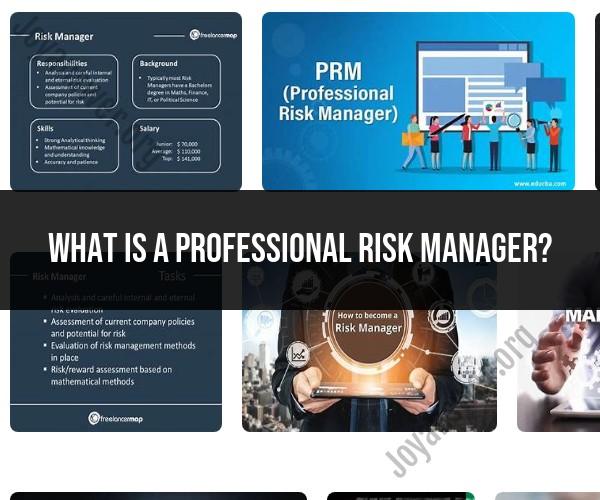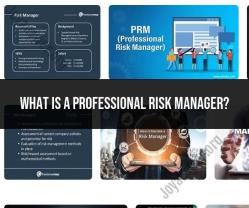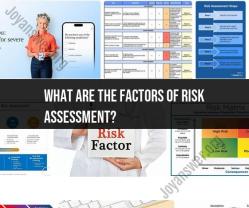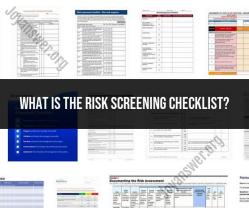What is a professional risk manager?
A professional risk manager is an individual who specializes in identifying, assessing, and managing risks within an organization. These risks can encompass a wide range of areas, including financial, operational, strategic, compliance, and reputational risks. Risk managers play a critical role in helping organizations make informed decisions to protect their assets, reputation, and financial stability. Here are the roles and responsibilities typically associated with professional risk managers:
Risk Identification: Risk managers are responsible for identifying and categorizing potential risks that could affect the organization. This involves a thorough analysis of internal and external factors that may pose a threat.
Risk Assessment: Once risks are identified, risk managers assess their potential impact and likelihood. They use various tools and methodologies to quantify risks and prioritize them based on their significance.
Risk Mitigation and Control: After assessing risks, risk managers develop strategies and plans to mitigate or control them. This may involve implementing preventive measures, risk transfer through insurance, or developing risk management policies and procedures.
Insurance Management: Risk managers often oversee an organization's insurance program, ensuring that it is appropriate and cost-effective. They may negotiate insurance contracts, assess coverage needs, and file claims when necessary.
Compliance and Regulatory Oversight: Risk managers monitor regulatory changes and ensure that the organization complies with relevant laws and regulations. They work to minimize compliance risks and penalties.
Financial Risk Management: Managing financial risk is a crucial part of the role. This includes managing exposure to market risks (such as interest rate and currency exchange rate risks), credit risks, and liquidity risks.
Operational Risk Management: Identifying and mitigating risks related to an organization's day-to-day operations, processes, and systems, including technology and cybersecurity risks.
Strategic Risk Management: Assessing and managing risks associated with the organization's long-term strategies, business models, and strategic initiatives.
Risk Communication: Risk managers often communicate risk information to senior management, board members, and other stakeholders, helping them understand the implications of various risks and the effectiveness of risk management strategies.
Crisis Management: In the event of a crisis or emergency, risk managers may be involved in developing and executing crisis management plans, ensuring that the organization can respond effectively to unexpected challenges.
Stakeholder Engagement: Collaborating with various stakeholders, both internal and external, to address and manage risks effectively.
Monitoring and Reporting: Continuous monitoring of risk exposures, tracking key risk indicators, and providing regular reports to management and stakeholders.
Risk Culture and Education: Promoting a culture of risk awareness and educating employees about risk management principles and practices.
Professional risk managers often hold certifications such as the Chartered Financial Analyst (CFA), Certified Risk Manager (CRM), or Professional Risk Manager (PRM) to demonstrate their expertise and qualifications. Their work is crucial in safeguarding an organization's stability, financial health, and reputation in an increasingly complex and uncertain business environment.
The Role and Responsibilities of a Professional Risk Manager
A professional risk manager is responsible for identifying, assessing, and managing the risks faced by an organization. Risk managers work to develop and implement risk management strategies and procedures to minimize the impact of risks on the organization's assets, operations, and reputation.
Risk managers typically have a wide range of responsibilities, including:
- Identifying and assessing risks
- Developing and implementing risk management strategies and procedures
- Monitoring and reviewing risk management strategies and procedures
- Communicating risks to senior management and other stakeholders
- Managing risk response activities, such as risk avoidance, mitigation, transfer, and acceptance
- Providing training and education on risk management to staff
Key Skills and Qualifications for Success in Risk Management
Risk managers need to have a strong understanding of risk management principles and practices. They also need to have a good understanding of the organization's business and industry. Additionally, risk managers need to have excellent communication and interpersonal skills.
Some of the key skills and qualifications for success in risk management include:
- Strong analytical and problem-solving skills
- Ability to think strategically and creatively
- Excellent communication and interpersonal skills
- Ability to work independently and as part of a team
- Ability to manage multiple projects simultaneously
- Up-to-date knowledge of risk management principles and practices
- Understanding of the organization's business and industry
Risk Management Strategies and Techniques
There are a number of different risk management strategies and techniques that can be used to minimize the impact of risks on an organization. Some of the most common risk management strategies and techniques include:
- Risk avoidance: Avoiding the risk altogether.
- Risk mitigation: Reducing the likelihood or impact of the risk.
- Risk transfer: Transferring the risk to another party, such as an insurance company.
- Risk acceptance: Accepting the risk and taking no further action.
The best risk management strategy for a particular risk will depend on the specific circumstances of the organization and the risk itself.
Risk Management in Different Industries and Sectors
Risk management is important in all industries and sectors. However, the specific risks that organizations face can vary depending on their industry and sector. For example, financial institutions face different risks than manufacturing companies or healthcare providers.
Risk managers need to be aware of the specific risks that their organization faces and develop risk management strategies and procedures to mitigate those risks.
Career Opportunities and Growth in Risk Management
Risk management is a growing field with a wide range of career opportunities. Risk managers can work in a variety of industries and sectors, including finance, healthcare, manufacturing, and technology.
There are also many opportunities for career growth in risk management. Risk managers can advance to senior positions within their organization or they can start their own risk management consulting business.
Overall, risk management is a rewarding career that offers a wide range of opportunities for professional growth and development.




